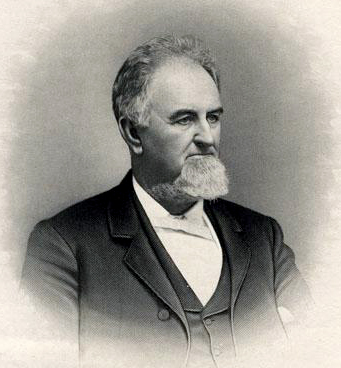22 Sept. 1829–24 Feb. 1905

George Howard, Jr., lawyer and judge, was born in Tarboro, the son of George and Alice Thurston Clark Howard. His father, a native of Howard County, Md., moved to Halifax in 1824 and founded, edited, and published the Free Press, a weekly newspaper. Two years later he went to Tarboro, Edgecombe County, continuing the Free Press until 1836, when it was called the Tarboro Press. In 1852 the name was changed to the Tarboro Southerner, and today it is called the Daily Southerner, enjoying the distinction of being among the oldest newspapers in the state.
Young Howard was educated at the Tarborough Male Academy and in 1849 entered The University of North Carolina, where for two years he studied law under Judge William H. Battle and Samuel F. Phillips. After the first term of the Supreme Court of 1850 granted him a license, he began a practice in Edgecombe County. A year later he received his Superior Court license and was immediately elected to serve as county solicitor in the Court of Pleas and Quarter Sessions of Greene County. At this time the town of Wilson in Edgecombe County had begun to grow in population and importance. In 1854, Howard decided to move there and practice law. In November of that year he went to Raleigh at the opening of the legislature to urge the passage of a bill that would establish Wilson County. The bill was passed and ratified, and on 15 Feb. 1855 that section of Edgecombe County became known as Wilson County. Howard promoted the growth of the town of Wilson, his home for ten years. After the Civil War he returned to Tarboro, where he lived and practiced law until his death.
In 1858 Governor John W. Ellis offered Howard the seat in the Supreme Court vacated by Judge Matthias E. Manly and the General Assembly of 1859 elected him to the office for life. "His fine presence, quickness of apprehension and legal abilities gave him large success upon the bench" and "he maintained . . . his reputation as a lawyer and as a presiding and administrative judicial officer, he was not excelled by any."
When the state convention of May 1861 was called, Howard and William S. Battle were elected delegates by the people of Edgecombe. Howard believed that as "by the exercise of the sovereignty of the people of the State in Convention assembled, the State had entered into the Union, when in like manner they chose to exercise their sovereign right again, they could withdraw from the Union and in doing so they could not be guilty of treason to either the State or Federal Government." He voted against an ordinance justifying secession because of the course urged by President Lincoln. In the organization of the convention, Howard was made chairman of the Committee on Military Affairs and served for the duration of the convention, which remained in session until May 1862.
On 2 Oct. 1865 he was elected to the convention that met in Raleigh to debate the legal and political effects of the Ordinance of Secession. Howard was one of nine men who were willing to vote to repeal the ordinance, but refused to vote that it was null and void, despite threats of political and perhaps personal destruction. (One of the other nine men was Colonel Dennis D. Ferebee of Camden County. In 1901 Ferebee's grand-daughter, Mary, married Howard's youngest son, Stamps.)
Howard did not hold public office after 1866, although he served on a commission appointed by Governor Alfred M. Scales to recommend reforms in the state revenue system. He was for many years a director of the Wilmington and Weldon (later the Atlantic Coast Line) Railroad Company, and from 1885 to 1893 a member of the board of trustees of The University of North Carolina. In his hometown of Tarboro he served as a town commissioner, president of the Pamlico Banking and Insurance Company, and director of the Tarboro Cotton Mills and Fountain Mills. He continued to participate in every phase of the town's social, political, and economic life, and was an elder of the First Presbyterian Church.
On 3 Dec. 1861 Howard married Anna Ragland Stamps, the daughter of Dr. William Lipscombe and Elizabeth Jiggetts Stamps of Caswell County. They had six children: Elizabeth (m. Dr. Julian Meredith Baker), George III (m. Elizabeth Rawls), Harriet (m. George Allen Holderness), Alice (m. Job Cobb), William Stamps (m. Mary MacPherson Ferebee), and Mary Romaine (m. William Thomas Clark).
Howard died at his home in Tarboro, where he was buried beside his wife who died on 11 June 1901. His professional attainments were "splendidly summarized" by Judge Henry Groves Connor at the presentation of his portrait to the North Carolina Supreme Court on 13 Feb. 1917. Another portrait hangs in the Edgecombe County Courthouse, Tarboro.